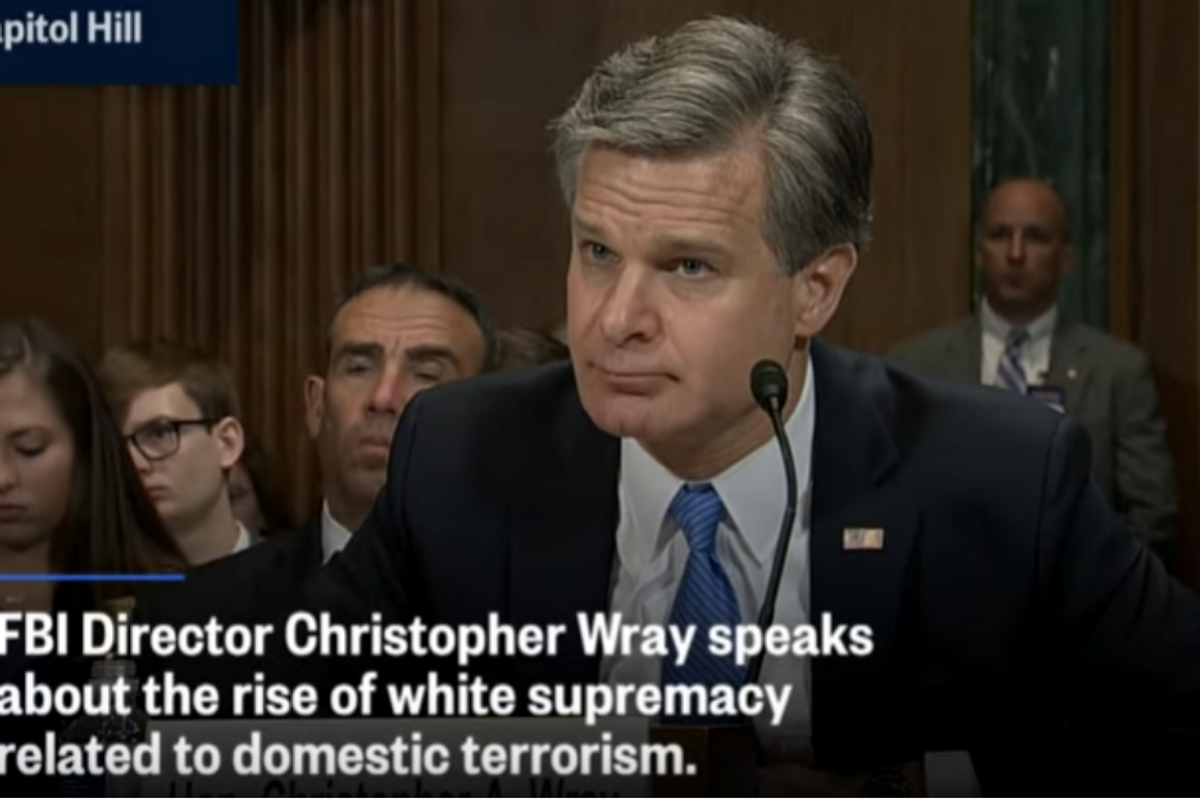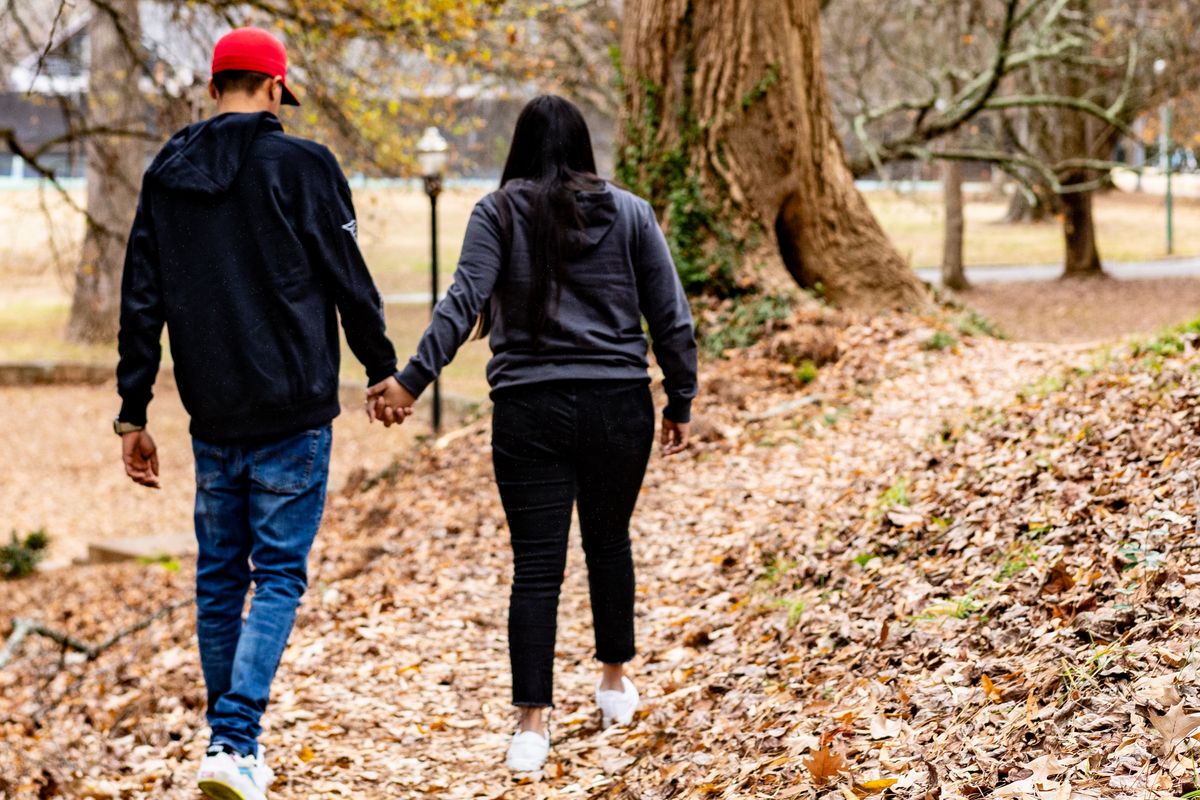
When politicians use terrorism as a tool for swaying voters, they usually mean a specific kind of terrorism. This became clear in the 2016 election season when then-candidate Trump falsely accused President Obama and Hillary Clinton of refusing to use specific words to describe it.
Say it with me, everyone: "Radical Islamic terrorism."
But there's another face of terrorism in the U.S. that often gets overlooked—one that looks, on the surface, like more than half of the U.S. population.
FBI Director Christopher Wray told Congress this week that most of the domestic terrorism arrests made so far this fiscal year have been associated with white supremacy. He pointed to about 100 arrests of "homegrown violent extremist terrorists" (these are generally the "radical Islamic terrorists") and about the same number of "domestic terrorists" (violent Americans with some kind of domestic beef), clarifying that the latter were mostly white supremacists.
In other words, there appear to be just as many all-American terrorists as there are "radical Islamic terrorists" in the U.S., and most American terrorists are white supremacists.
FBI Director Christopher Wray: 'Majority' Of Domestic Terrorism Cases Are White Supremacy | NBC Newswww.youtube.com
This is nothing new. A database compiled in 2017 by The Investigative Fund (now Type Investigations) found that between 2008 and 2016, plots and attacks by right-wing terrorists—which includes white supremacists, militias, and sovereign citizens movements—actually outnumbered Islamist plots and attacks by a ratio of 2 to 1.
And it's not like the government is unaware of the fact that white supremacists pose a major threat to American citizens. The FBI and Department of Homeland Security has warned of the threat of white supremacist terrorism since early in Trump's presidency. Wray referred to white nationalist extremist violence a "persistent, pervasive threat" in April of this year.
And yet, how often have we heard the president warn Americans about the threat of right-wing or white supremacist terrorism? Why has he never harped on "white supremacist terrorism" with the same fervor as "radical Islamic terrorism"?
One could try to argue that perhaps the president is tackling this issue quietly, behind the scenes, but that argument wouldn't hold water.
RELATED: A troll demanded a Muslim man show examples of 'Christian terrorists.' He delivered.
Despite his intelligence agencies warnings, Trump slashed the office that housed the task force for Countering Violent Extremism and canceled Obama-era grants that funded programs to help fight violent extremism of all kinds, including religious extremism and white supremacy. One organization that lost its funding was Life After Hate, a non-profit founded by a former skinhead that helps people leave Neo-Nazi and white supremacist movements.
This administration has also taken an extreme hard line on immigration and refugee resettlement, citing the risk of terrorism as part of its reasoning. Indeed, a new study from a researcher at Columbia University shows that terrorism does increase as immigration increases—but only domestic, right-wing terrorism.
"There is little evidence to support the common claim that letting in more immigrants means letting in more terrorists," wrote study author Richard J. Alexander in the Washington Post. "Immigrants don't pose a security risk. Rather, right-wing extremists who hate immigrants increase the threat of terrorism."
(This is where one could make the argument that by curtailing immigration Trump is stopping white supremacist terror attacks, because violent racists get less pissed off when there are fewer brown and black people entering the country. One could make that argument—but seriously?)
Interestingly, Wray told Congress he still feels that homegrown violent extremist terrorism is the bigger threat to the homeland. Perhaps this is due to the more organized nature of Jihadist groups or their access to funding. Or perhaps—just perhaps—it's because people like Wray are not the target of white supremacist violence.
I have to wonder: Are my fellow white Americans simply so accustomed to white supremacist violence, which has been happening in our country a lot longer than "radical Islamic terrorism," that we see it as not as big of a deal? Or do we ignore it because we are not the targets? Is a person of color in the U.S. in more danger from a "radical Islamic terrorist" or a white supremacist American? Are terrorists who commit violence against their fellow citizens while claiming to be American patriots really less of a "threat to the homeland" than the violent religious extremists who make it clear that they hate America? If it were discovered that the majority of domestic terrorism arrests were associated with "black supremacy" groups, how would America respond?
So many questions, but the fact remains that white supremacists are a significant threat to our nation's safety.
To be clear, I'm not suggesting we start banning white people from traveling to the U.S. like we did with the Muslim travel ban, or set up a hotline for victims of white supremacist crimes like the one the administration created for immigrant-perpetrated crimes. I'm suggesting we take the tack that Adam Serwer suggested in the Atlantic:
"The correct response to the rise in right-wing terrorism is not a nationwide panic that mirrors those that accompany terrorist attacks by religious or ethnic minorities. It is to extend the same benefit of the doubt, the same proportionate, measured response with which Americans meet attacks from right-wing extremists, to attacks of all sorts. It is to recognize that the constitutional rights of minorities are no less inviolable than the constitutional rights of white Americans, and that anyone who would run on a platform of disregarding those rights is not fit to hold public office."
We need to take the threat of white supremacist violence as seriously as we do other terrorism. We need to recognize that stereotyping any group of people based on the violent actions of a radical minority is wrong. And we need to challenge this administration to put its money where its mouth is when it talks about protecting Americans and reinvest in programs to counter violent extremisms of all stripes.


 A handwritten note with the words "good job!" on it
A handwritten note with the words "good job!" on it A man smiling
A man smiling A dad with his kid on his shoulders
A dad with his kid on his shoulders Sandra’s granddaughter, E’s daughter, and another friend at an indoor park (July 2025)
Sandra’s granddaughter, E’s daughter, and another friend at an indoor park (July 2025) One of the ladies Sandra sponsored from Venezuela and her partner during Sandra’s first visit to meet her (December 2023)
One of the ladies Sandra sponsored from Venezuela and her partner during Sandra’s first visit to meet her (December 2023) Im Old Tv Shows GIF by PBS SoCal
Im Old Tv Shows GIF by PBS SoCal  Kelsey Grammer as Dr. Frasier Crane in 1996By US Treasury Dept. Public Domain
Kelsey Grammer as Dr. Frasier Crane in 1996By US Treasury Dept. Public Domain Get Out Birth GIF
Get Out Birth GIF  Season 8 Episode 24 GIF by Friends
Season 8 Episode 24 GIF by Friends  Max Greenfield Comedy GIF by CBS Giphy
Max Greenfield Comedy GIF by CBS Giphy  Season 1 Baby GIF by Outlander
Season 1 Baby GIF by Outlander